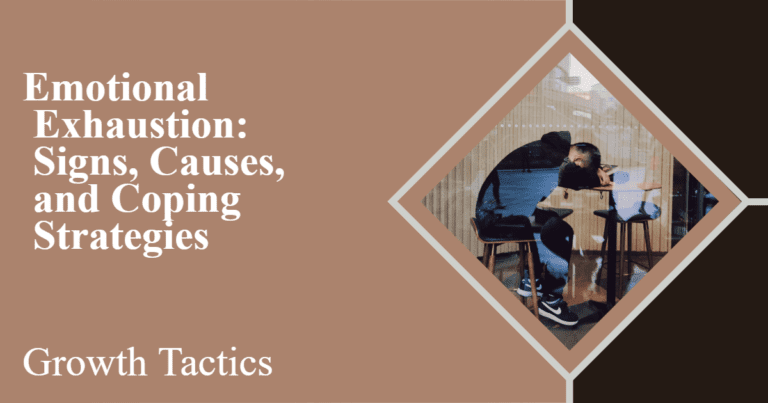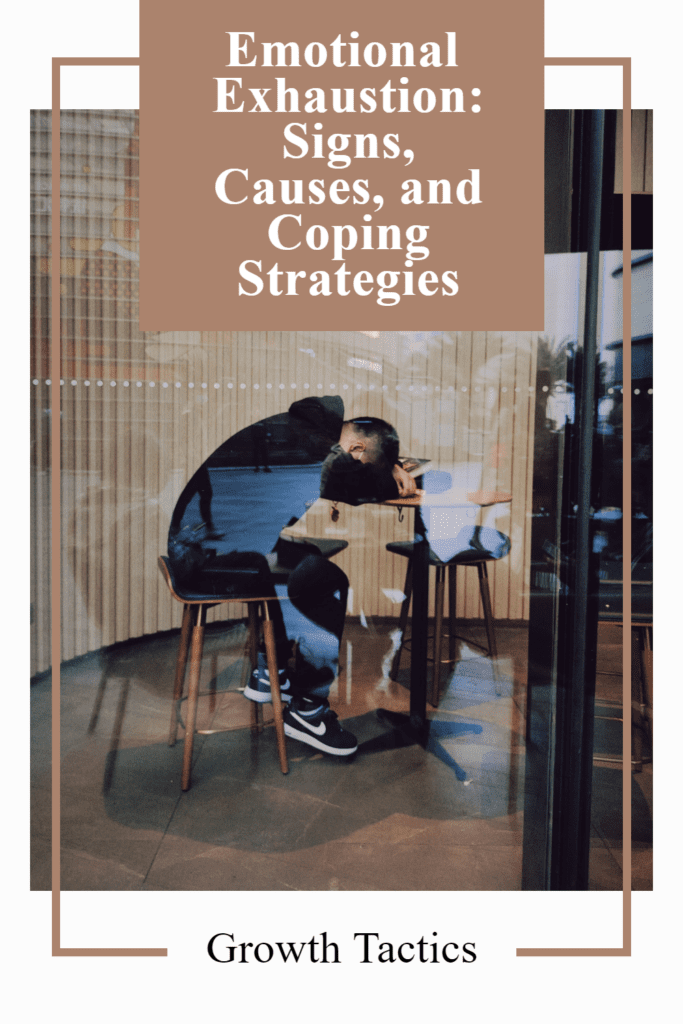We all experience emotional ups and downs in life, but sometimes, the weight of our emotions can become overwhelming. This is what we call emotional exhaustion, a state where we feel emotionally drained, mentally exhausted, and even physically depleted.
Emotional exhaustion often goes hand in hand with burnout, a condition characterized by a chronic lack of energy and motivation. In this article, we will explore the signs, causes, and coping strategies for emotional exhaustion and burnout, with a particular focus on caregivers who are at a higher risk.
Jump To Section
Understanding Emotional Exhaustion
Emotional exhaustion is more than just feeling emotionally tired. It can have a significant impact on both our physical and emotional well-being. When we experience emotional exhaustion, we might find ourselves feeling emotionally numb, detached, or constantly overwhelmed by our emotions. It becomes challenging to fully engage in personal relationships and daily activities.
Causes of Emotional Exhaustion: Why Do We Feel Emotionally Drained?
We all experience emotional ups and downs in life, but when those ups and downs become a constant state of mental exhaustion, it’s essential to pinpoint the underlying causes.
Emotional exhaustion can stem from various factors, and understanding these causes can help us address and manage this draining state more effectively. Let’s take a closer look at some of the key factors that contribute to emotional exhaustion.
The Weight of Chronic Stress
One significant cause of emotional exhaustion is chronic stress. When we continuously face high levels of stress for an extended period, it takes a toll on our physical and emotional well-being.
Whether it’s due to work pressures, ongoing relationship conflicts, or financial difficulties, the daily stressors can build up, leaving us emotionally drained. Our body’s stress response system becomes overburdened, leading to emotional exhaustion.
Excessive Workload and Demands
Another common cause of emotional exhaustion is an excessive workload and work-related demands. Whether you’re juggling multiple tasks and deadlines or dealing with a demanding job that leaves little time for rest and relaxation, the weight of these responsibilities can become overwhelming.
It’s as if we’re constantly carrying a heavy emotional load, depleting our energy and leaving us feeling drained both physically and emotionally.
The Emotional Labor of Caregiving
Caregivers, in particular, are at a higher risk of experiencing emotional exhaustion. The emotional labor involved in caring for others, be it as a parent, a healthcare professional, or a support system for a loved one, can take a tremendous toll on our emotional well-being.
The constant emotional demands and responsibilities of caregiving can leave us feeling emotionally drained, especially when coupled with limited support and the challenge of balancing our work and personal lives. It’s a double-edged sword, where the love, compassion, and care we provide for others can lead to emotional exhaustion.
Recognizing the Symptoms: Listening to Your Body and Mind
When it comes to emotional exhaustion, early intervention is key. The sooner we recognize the signs, the sooner we can take steps to address and alleviate this draining state. So, let’s dive into the common symptoms of emotional exhaustion and understand why they should never be ignored.
Persistent Fatigue
One of the telltale signs of emotional exhaustion is persistent fatigue. It’s not just the usual tiredness that can be remedied with a good night’s sleep or a short break. Emotional exhaustion leaves you feeling utterly drained, both physically and mentally.
No matter how much rest you get, you still wake up feeling exhausted and struggle to find energy throughout the day. It’s as if a heavy fog envelops your body, making every step feel like a monumental effort.
Irritability
Have you noticed yourself becoming easily irritated or snapping at others over minor things? This heightened irritability is another common symptom of emotional exhaustion.
Your emotional reserves are depleted, and even the most trivial annoyances can push you over the edge. The usual patience and tolerance you once had seem to have evaporated, leaving you feeling on edge and quick to react.
Decreased Motivation
Emotional exhaustion can lead to a significant decrease in motivation. It’s as if the flame that once fueled your passion and drive has dimmed.
You may find yourself struggling to perform even the simplest tasks or lacking enthusiasm for activities that used to bring you joy. Your once vibrant and ambitious self may feel like a distant memory, leaving you with a sense of emptiness and apathy.
Difficulty Concentrating
A foggy mind and scattered thoughts are common companions of emotional exhaustion. It becomes increasingly challenging to concentrate and stay focused on a task.
You may find yourself easily distracted, jumping from one thought to another, unable to hold and process information effectively. This cognitive fog can further contribute to your feeling of exhaustion and frustration.
A Sense of Cynicism
Emotional exhaustion often gives rise to a sense of cynicism. You may find yourself becoming skeptical or pessimistic about things that you used to see in a more positive light.
This cynical outlook can color your interactions and relationships, making it difficult to connect with others genuinely. The emotional exhaustion may lead you to nurture negative thoughts and expect the worst in situations.
Physical Manifestations: The Mind-Body Connection
Emotional exhaustion doesn’t just affect the mind; it can also take a toll on the body. You may experience physical symptoms such as frequent headaches, trouble sleeping, and gastrointestinal problems.
These manifestations serve as a reminder that our emotional well-being is intricately connected to our physical health. Ignoring these physical indicators can lead to further deterioration of our overall well-being.
Ignoring the Signs Is Not an Option
It’s crucial not to ignore these symptoms of emotional exhaustion, as they are not merely fleeting feelings. They can signal a larger problem that needs to be addressed.
Recognizing the signs and acknowledging that you may be experiencing emotional exhaustion is the first step toward regaining your well-being and vitality.
If any of these symptoms resonate with you, it’s essential to prioritize your self-care and seek support from loved ones or professionals. Remember, you don’t have to face emotional exhaustion on your own.
There are resources and strategies to help you navigate this challenging state and rediscover your emotional balance.
The Link between Emotional Exhaustion and Burnout
Emotional exhaustion often leads to burnout, which is a more severe and long-lasting state of physical and emotional exhaustion. Burnout goes beyond feeling tired; it affects our overall well-being and can significantly impact our ability to function effectively. It’s essential to address emotional exhaustion to prevent it from escalating into burnout.
Ways to Cope and Recover: Taking Charge of Your Emotional Well-being
Dealing with emotional exhaustion is no walk in the park, but there are ways to cope and recover. By prioritizing self-care and implementing strategies to protect your mental and physical health, you can take charge of your emotional well-being.
Let’s explore some effective coping mechanisms and recovery methods that can help you regain your energy and find balance.
Prioritize Self-Care: Nurturing Your Mind and Body
Self-care is not a luxury; it’s a necessity, especially when it comes to preventing emotional exhaustion. Make sure to carve out time for activities that bring you joy and replenish your energy.
Whether it’s spending time in nature, indulging in a hobby, or treating yourself to a relaxing bath, find what nourishes your mind and body. Remember, taking care of yourself is not selfish; it’s an investment in your overall well-being.
Engage in Regular Exercise: Energize Your Body and Mind
Physical activity is a powerful tool in combating emotional exhaustion. Regular exercise releases endorphins and boosts serotonin levels, helping to elevate your mood and reduce stress.
Whether it’s going for a jog, practicing yoga, or dancing to your favorite music, find a form of exercise that you enjoy. Even small bursts of movement throughout the day, like taking short walks or stretching, can make a big difference in restoring your energy levels.
Practice Relaxation Techniques: Find Your Zen
Incorporating relaxation techniques into your daily routine can do wonders for your emotional well-being. Whether it’s deep breathing exercises, meditation, or mindfulness practices, these techniques promote relaxation and help calm an overactive mind.
Set aside a few minutes each day to unwind and center yourself. You’ll be amazed at how even a short break can rejuvenate your spirits and provide a renewed sense of focus.
Seek Support: Lean on Loved Ones and Professionals
You don’t have to face emotional exhaustion alone. Reach out to your loved ones and let them know how you’re feeling. Sharing your struggles and concerns can provide comfort and support.
If necessary, consider seeking guidance from a therapist or counselor who can provide specialized help and techniques for managing emotional exhaustion. The validation, empathy, and expert advice you receive can make a world of difference in your journey to recovery.
Find a Healthy Work-Life Balance: Set Boundaries and Unplug
One common cause of emotional exhaustion is a lack of work-life balance. It’s essential to set boundaries and create space for yourself outside of work. Unplug from technology during your downtime to minimize distractions and allow your mind to rest.
Learn to say no to excessive work demands, and delegate tasks when possible. By creating a healthy work-life balance, you’ll prevent emotional exhaustion from seeping into every aspect of your life.
Conclusion
Emotional exhaustion and burnout are prevalent in today’s fast-paced and demanding world, affecting individuals across various professions and life circumstances.
By recognizing the signs, understanding the causes, and implementing effective coping strategies, we can navigate emotional exhaustion and promote our overall well-being. Remember, taking care of ourselves is not selfish but vital for our own happiness and ability to care for others.
Let’s prioritize self-care and build resilience to thrive in the face of emotional challenges.
Note: Understanding emotional exhaustion and burnout is crucial, but this article is not a substitute for professional advice. Please consult a healthcare professional or therapist for a personalized assessment and guidance.


